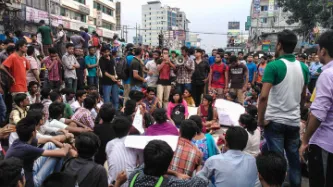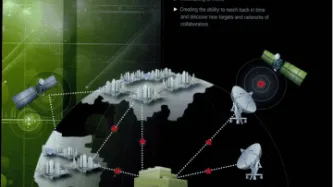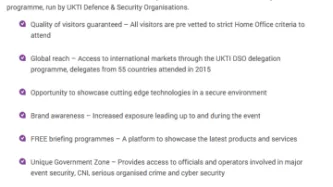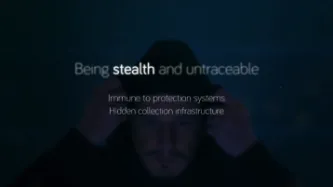Search
Content type: Long Read
Imagine that every time you want to attend a march, religious event, political meeting, protest, or public rally, you must share deeply personal information with police and intelligence agencies, even when they have no reason to suspect you of wrongdoing.
First, you need to go to the police to register; have your photo taken for a biometric database; share the contacts of your family, friends, and colleagues; disclose your finances, health records, lifestyle choices, relationship status, and…
Content type: Long Read
Creative Commons Photo Credit: Source
UPDATE: 30 July 2019
Privacy International has identified the following:
Two RAB officers received approval to travel to the USA in April 2019 for training on “Location Based Social Network Monitoring System Software for RAB Intelligence Wing”
Three RAB officers received approval to travel to Russia in August 2017 to participate in user training of “Backpack IMSI Catcher (2G, 3G, 4G)” paid for by Annex SW Engineering, a…
Content type: Long Read
Image: Eric Jones
The UK government last week hosted hundreds of surveillance companies as it continues to try and identify “technology-based solutions” able to reconcile the need for controls at the Irish border with the need to avoid them.
The annual showcase conference of 'Security and Policing' brings together some of the most advanced security equipment with government agencies from around the world. It is off limits to the public and media.
This year’s event came as EU and UK…
Content type: Explainer
Phone networks are divided between two networks: the physical and the mobile. The physical runs on the Public Switched Telephone Network (PSTN) that serves your home phone. Mobile networks are dominant in the age of communication and are used to relay mobile communications to the PSTN. The most prominent mobile networks are GSM networks (Global System for Mobile communications) and are what we use everyday to communicate with one another. Another system is known as CDMA (Code Division Multiple…
Content type: Explainer
Video surveillance technologies are deployed in public and private areas for monitoring purposes. Closed-circuit television (CCTV)– a connected network of stationary and mobile video cameras– is increasingly used in public areas, private businesses and public institutions such as schools and hospitals. Systems incorporating video surveillance technologies have far greater powers than simply what the camera sees. Biometric technologies use the transmitted video to profile, sort and identify…
Content type: Press release
The release of a new report by Privacy International exposes Colombia's intelligence agencies' previously unknown history of developing communications surveillance capabilities outside of lawful authority.
The report “Shadow State: Surveillance law and order in Colombia” reveals, via previously unreleased documents, the Colombian police agencies' and intelligence services' long history developing surveillance systems. Rather than building a well-regulated system of surveillance after Colombia…
Content type: News & Analysis
Surveillance companies and government officials from across the world are gathering in the UK this week at the invitation of the Home Office for the UK’s “Premier Security and Law Enforcement Event’, one week after the controversial spying legislation, entitled the Investigatory Powers Bill, had its first reading in Parliament.
Delegates and companies will be attending the three-day long ‘Security and Policing’ trade show in Farnborough, the historical centre of the UK’s aerospace industry.…
Content type: News & Analysis
In an enormous breakthrough for those seeking transparency and accountability to the shadowy surveillance industry, the Swiss Government has been forced to publish the list of export licenses for surveillance technologies and other equipment, including details of their cost and destination.
The decision by the Federal Information and Data Protection Commissioner comes on the heels of consistent pressure from Privacy International, Swiss journalists, and several Members of Parliament on…
Content type: Press release
Privacy International's new report exposes the companies that have built the Colombian Government's controversial and highly invasive surveillance systems. The report “Demand/Supply: Exposing the Surveillance Industry in Colombia” shows the extensive dealings that companies from Israel, the UK, the USA, Finland, and New Zealand, among other countries, have had in supporting Colombian government agencies in purchasing surveillance equipment. Many of the company's customers were agencies that did…
Content type: News & Analysis
Here are eight things we have learned from this week's hack of some 400GB of internal company material and correspondence from Italian surveillance company Hacking Team.
The Citizen Lab was right
The Citizen Lab, who in 2014 identified some 21 countries that are potential customers of Hacking Team, were right about all of them. A 2015 report stated that there was likely to be more. In fact, at least 45 countries are purchasers of Hacking Team's…
Content type: News & Analysis
The Swiss Federal Council has introduced a major amendment to its export licensing legislation in order to ensure surveillance technologies that might be used for human rights abuses are not exported from Switzerland.
What this means is that Swiss authorities must reject companies’ requests to export internet and mobile surveillance technologies if there “are reasonable grounds to believe” that the items could be used for repression in the country of destination.
The amendment…
Content type: News & Analysis
There is a common practice within the surveillance industry that makes the already murky market even harder to track: collaborating companies.
Within Privacy International's Surveillance Industry Index there are 83 documents detailing collaborations between companies involved in developing and selling surveillance technologies. These documents represent a variety of relationships – some are friendly companies, others advertise corporate partners, and some present themselves as a distributor of…
Content type: News & Analysis
The right to privacy is on the frontline of a struggle that has seen a number of other constitutionally protected rights threatened during the last few bloody months of Kenya's ongoing security crisis.
After at least 64 people were killed in two attacks by Al Shabaab militants in late 2014, members of the ruling Jubilee Coalition swiftly moved to introduce an omnibus bill, the Security Laws (Amendment) Bill 2014. The bill, which was hastily enacted into law despite street…
Content type: News & Analysis
Thousands of innocent people in London have had their communications spied on and collected through the use of invasive mobile phone surveillance technology, called IMSI Catchers, according to a recent report by the Times.
IMSI Catchers are no longer, and have not been for a while, a law enforcement secret. They have been featured crime dramas like the Wire and in movies such as Zero Dark Thirty. For years, the German Parliament has publicly received the number of IMSI Catcher…
Content type: News & Analysis
The 'GSOC saga' began a number of weeks ago with the revelation that the oversight body of the Irish police force, the Garda Siochana Ombudsman Commission (GSOC), may have been the target of sophisticated electronic surveillance. A security company, Verrimus, found that there was evidence that an IMSI Catcher device may have been deployed in the vicinity of GSOC's offices which could have intercepted all mobile phone communications of its officers and anyone visiting the offices. Following the…
Content type: News & Analysis
The recent revelations surrounding the bugging of the Garda Siochana Ombudsman Commission (GSOC) has raised a number of important questions about the use of surveillance technologies in Ireland, including whether fake base stations were deployed in order to monitor mobile networks near GSOC's office.
First, some background. The Garda Siochana are the Irish police force and are overseen by GSOC, who have investigated members of the police force on a number of occasions. Approximately a year ago…
Content type: News & Analysis
If you were a Middle Eastern tyrant or a Central Asian strongman, and you suddenly found your position of power under threat, where would turn for assistance? Well, Paris, it seems, is actually pretty good start.
This week, the city that gave us a defining revolution based on the very idea that we as human beings are entitled to certain universal rights, plays host to some 1,000 exhibitors and 30,000 attendees as part of Milipol 2013, one of the world’s foremost trade shows for law enforcement…
Content type: News & Analysis
For some time now, Gamma International has been criticised for exporting dangerous surveillance technologies from the UK to repressive regimes. Now, we are learning that the company is taking its show on the road, as recent reports have said that Gamma are now attempting to export its products, including the spyware FinFisher, out of Switzerland.
With sales premises registered at a site just outside the Swiss capital Bern, Gamma has now applied to the Swiss Secretariat for…
Content type: Press release
In collaboration with the Wall Street Journal and the Guardian, Privacy International today published a database of all attendees at six ISS World surveillance trade shows, held in Washington DC, Dubai and Prague between 2006 and 2009. ISS World is the biggest of the surveillance industry conferences, and attendance costs up to $1,295 per guest. Hundreds of attendees are listed, ranging from the Tucson Police Department, to the government of Pakistan, to the International…















